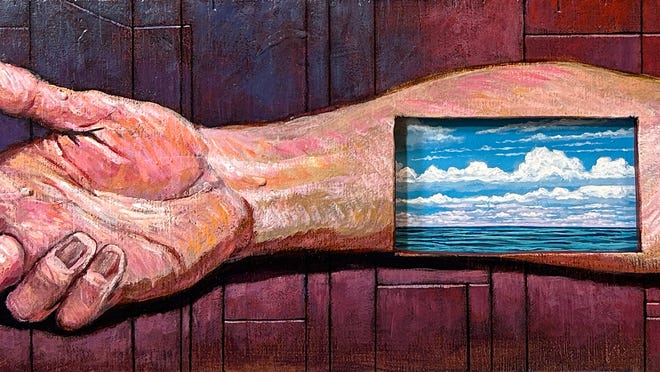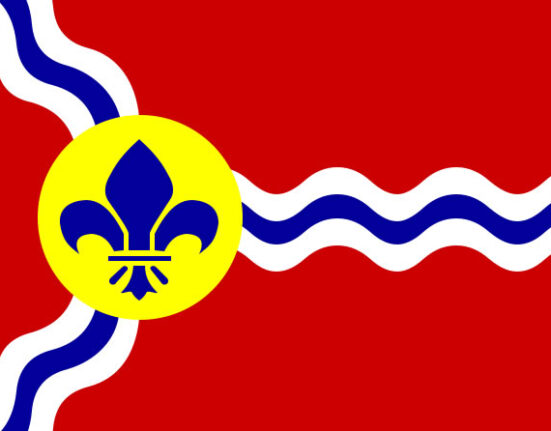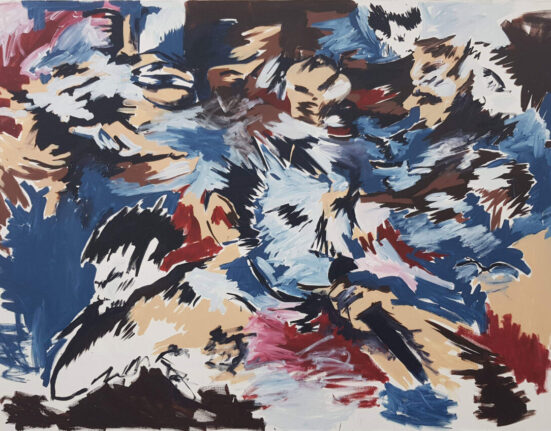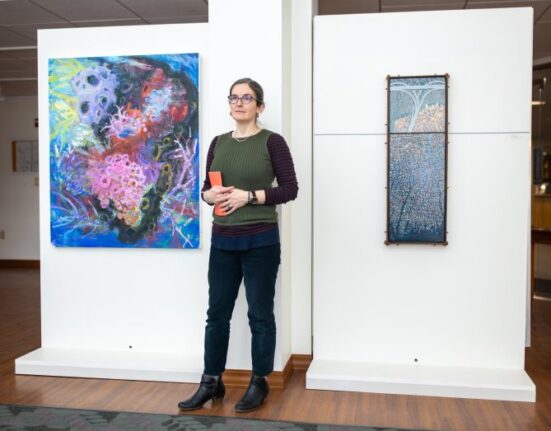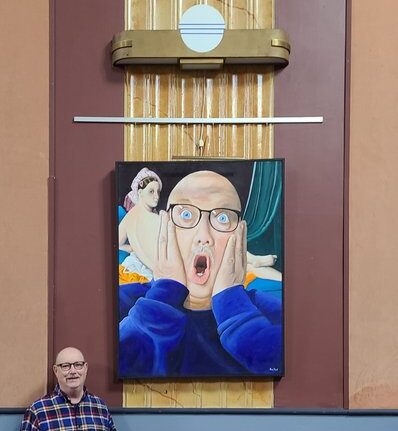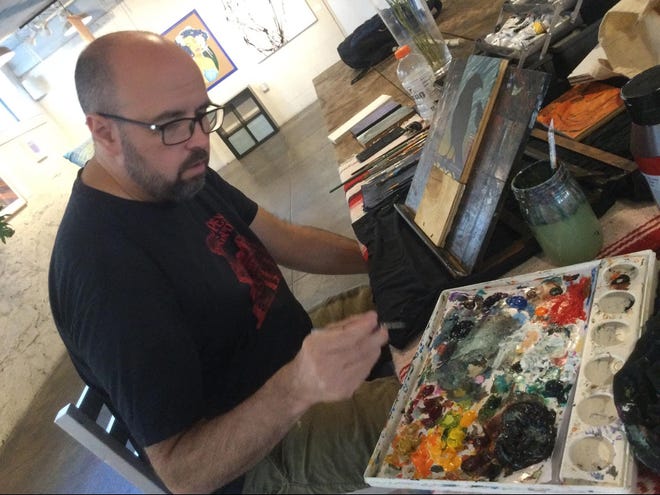
Perhaps you’ve seen Scott Boilard’s art in the form of a mural, depicting a large but graceful plesiosaurus, a marine animal from a byone era, adorning a wall at the corner of Green and Temple Streets. That’s an image that might stay with the viewer a long time, even if driving or walking past it.
But Boilard’s work is not only in well-known public art, and festivals celebrating public art, but in graphic design, illustration and commissioned portraits and other paintings. Boilard describes his work as a meeting of the natural and surreal, but it is also versatile, which he said has helped him build his life and career as an artist.
Can you tell me about your art and what kinds of media you use?
I do a lot of kind of surrealist work, kind of bordering on the fantastic. I do quite a bit from the natural world, kind of animals and sea life, things like that. Usually, in paintings, I do a lot like birds and animals … a lot of my largest pieces for gallery shows, I do a lot of figurative stuff, the human form.
My larger pieces are usually on canvas. That is my favorite medium, oils. The smaller ones for festivals, I do acrylic. I paint them on small blocks of wood, reclaimed wood. Acrylic is durable. You can do it a lot quicker. For festivals, people can pick them up, like at stART on the Street.
Oil is my preferred medium, because you don’t have the dry time, the fixing time. What you put on oil, usually dries in the same type of color. Acrylic dries so fast, but you lose a lot of the painting. Drawing from the pallet, oils, you can mix liberally. You can mix a bunch of color, and pick when and where you need them … acrylic, you more or less have to use them right away.
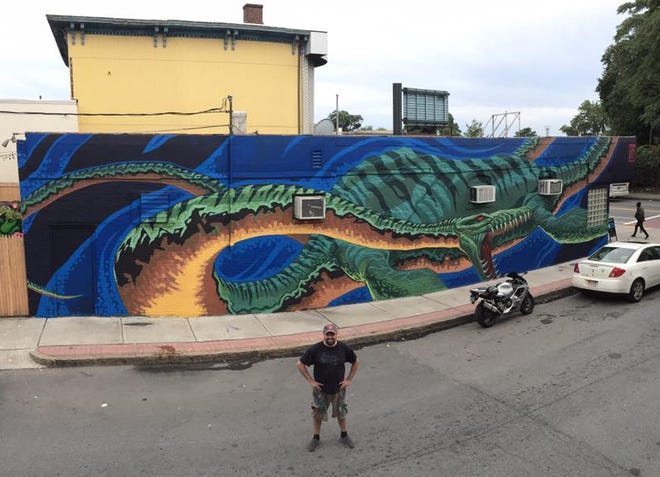
Tell me about the public art you do, and how you got involved.
Well, I haven’t done a lot of pieces. I’ve done some murals … I got involved through the POW! WOW! Mural Festival in Worcester, a few years back … they got artists from around the world. They thought they should have a few Worcester artists involved in this festival as well. So, they erected these temporary walls on the (Worcester Common.) They were made of PVC panels, and we and other artists painted on these walls for a week. At the Pow! Wow! festival, each artist had 10 days to make a mural.
I painted this mural, and it went to the Sprinkler Factory (a former art gallery in the city.) I have it in my studio right now. That was the first year they did the festival. (2016.) The next year, they (brought) me back to do a more permanent (work.) They assigned me to the Dive Bar, (a now-closed business,) at the corner of Green Street and Temple Street. I painted a large picture of a sea monster, like a Loch Ness monster. They got some attention. The owner of the business really liked it.
From there, a man … who owned a stationery store in West Boylston hired me to do a large mural on the side of his business in West Boylston, so I did that. It was fun. It was a good job. I was asked to do a couple more murals, then was hired to do some interior murals, in Worcester, and one in Vermont, at someone’s vacation home.
I may have a couple of murals to do soon.
More:DJ QBert set to headline night of beats and visual arts at Electric Haze
More:Janice Harvey: Woodland Street Preparatory stirs memories
Are you doing your art fulltime?
Pretty much fulltime. I have a side gig for a little extra money. I have some commissions, some small paintings, commission pieces, and things like that.
It sounds like being versatile is the key to the enterprise.
In the past few years, I’ve done a few murals. I’ve done a few logo designs. I’ve done a couple of book illustrations. Someone commissioned me to do a portrait of a deceased family member. If you think of it, I’ve probably done it — oil paintings, acrylic paintings, graphic design, digital work. Yes, you do have to be versatile … if you are not financially set to begin with, and you are doing it as your job, the more things you do, the better.
When I got out of school … I got a job at Checkerboard (a stationery creator and printer, now part of a multibusiness copmlex known as Checker Place.) I was lucky. They liked my work. They trained me to be a graphic designer on the job. That was 2003. Not just a graphic design on a computer, but how to use a computer. I did it 10 years. Then, I went to work for a sign company in Worcester, that I did for four years.
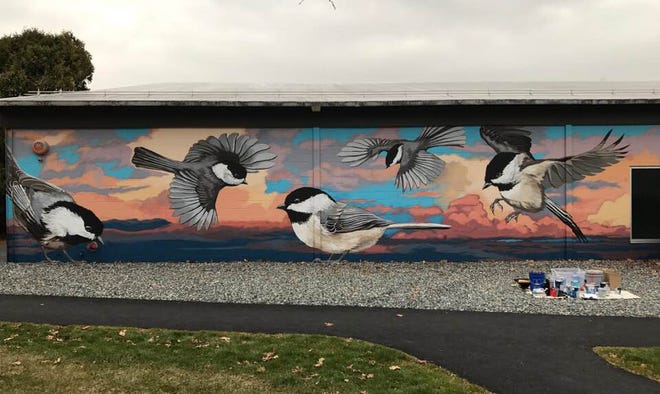
If someone is contemplating a career in the arts, what is something you have learned that you can pass on?
Know as many people as possible. Network with people. People buy their friends’ art. They buy art from people they like. Knowing people leads to meeting with other people.
Go to a lot of shows. Got to a lot of gallery openings. Meet people. Talk to people. Build your network. If you know people, and are easy to work with and nice to deal with, people will remember that, and open up opportunities to you.
About a week ago, I did Hot Night in City, (held July 19) at the Worcester Center for Crafts. I was in the gallery opening. I was in the show, but I was also outside, with the vendors. I had a booth. Candace Casey, (event coordinator) at Worcester Center for Crafts, she knows me, and she had gotten contacted by this marketing group. They needed someone at a festival down in Attleboro. They wanted someone to do a live painting, and she contacted me. If you are reliable, and you are known for quality work, your name will get around.
I’ve been lucky. I’ve been able to build up a network in the past 20 years. It helps me. It definitely helps me.

